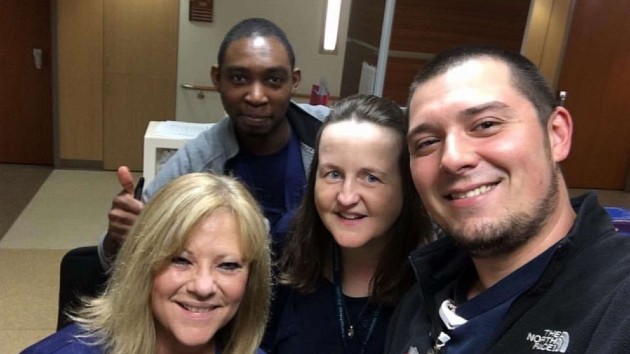
Courtesy Christine Danderand
 Courtesy Christine DanderandBy KATIE KINDELAN, ABC News
Courtesy Christine DanderandBy KATIE KINDELAN, ABC News
(NEW YORK) — Early on in the coronavirus pandemic, health care workers became known as “health care heroes” and received rounds of applause in what became a nightly ritual in many cities across the United States.
Now, as the pandemic surges on and hospital intensive care unit beds fill to near capacity across the country, people are finding new ways to support health care workers during the holiday season.
Christine Danderand, a makeup artist in Nebraska, decided she wanted to help after seeing the stress felt by her own mom, a registered nurse in Nebraska who works directly with hospitalized COVID-19 patients.
Danderand, who, along with her husband and daughter, battled COVID-19 earlier this year, started a Facebook page where she thought a few dozen friends and family members could sign up to fulfill Amazon wish lists made by her mom’s colleagues.
Three weeks later, Danderand’s Facebook page, “Adopt A Nurse/Health Care Worker,” now has over 11,000 members who have fulfilled the wishes of over 1,000 health care workers, and counting, around the world.
“We tried to keep track of how many were gifted but found that was insurmountable and lost track at 1,000,” said Danderand. “It’s grown into this thing that I could have never seen coming.”
With COVID-19 restrictions in place for large gatherings, Danderand’s makeup business has faced a downturn, so she is using her free time to run the Facebook page. She said support has come not only from the public donating to health care workers — everything from slippers to food — but also from other health care workers stepping up to contribute.
In one case, a group of nurses struggling to get by had their entire Christmases — from meals to gifts for their kids — donated to them, according to Danderand.
“We have physicians that are adopting entire units, nurses who are secretly adopting units in their own hospitals and we had nurses in New York City who adopted nurses here in Nebraska,” she said. “I just had a thought to get my mom and her coworkers adopted and that we now have it happening to people across the country is unbelievable to me.”
In Arkansas, University of Arkansas for Medical Sciences volunteer coordinator Marcia Dunbar oversees a new project that allows local business and community members to “adopt” its units of health care workers.
People have been baking cookies, sending pizzas and snacks and even making homemade Christmas ornaments for health care workers, who Dunbar points out are running the hospital without the usual army of volunteers that typically come to help.
“That almost doubles the workload,” Dunbar said of the lack of volunteers. “While they show up with smiles and this sheer drive to do their jobs and save lives, it’s a very difficult time for them.”
Alisa Carlock, an ICU nurse at UAMS for the past 13 years, said receiving treats from the public is both a “recharge” and a reminder that health care workers are valued.
“It sounds crazy but a 50-cent bag of chips means the world to us because we know that someone is thinking of us,” she said. “It means so much that somebody is out there saying, ‘Hey, we’re thinking of you and here’s a small token.'”
Carlock described working four or five 12-hour shifts per week for the past several months and said her job is as stressful as ever now with ICU beds filled with COVID-19 patients.
She said some of the best surprises she and her colleagues receive are when former patients “adopt” their unit, or just send a simple note to thank them.
Carlock recalled receiving a thank you card and photo from a patient who was extremely ill with COVID-19.
“We went to basically the most extreme measures to save her and when she left the unit she was giving us a thumbs up, and you always wonder what happens next,” she said. “So to see the picture of her looking great and her handwritten note, to know that she’s completely with it and doing well means that us sweating buckets and busting our tail ends really made a difference this time.”
Copyright © 2020, ABC Audio. All rights reserved.